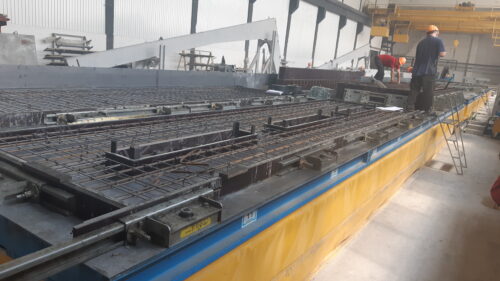Magnetic formwork in production: a revolutionary breakthrough.
 In modern construction new technologies and innovations that improve processes and increase the efficiency of construction work are constantly emerging. One such innovation is magnetic formwork, which brings a revolutionary change in production. In this article, we will look at what magnetic formwork is in production and what benefits it provides in the construction process.
In modern construction new technologies and innovations that improve processes and increase the efficiency of construction work are constantly emerging. One such innovation is magnetic formwork, which brings a revolutionary change in production. In this article, we will look at what magnetic formwork is in production and what benefits it provides in the construction process.
Definition of magnetic formwork:
Magnetic formwork in manufacturing is a formwork system based on the use of magnets to secure the formwork elements. Instead of the traditional methods of using bolts, welding or other fasteners, magnetic formwork makes it quick and easy to install, move and remove the formwork.
Advantages of magnetic formwork:
- Saving time and increasing productivity: One of the main advantages of magnetic formwork is that it reduces the time to set up and remove the formwork. With the magnetic system, the formwork elements can be quickly engaged and fixed and easily repositioned. This considerably increases productivity and shortens the working time.
- Improved safety: Magnetic formwork provides a safer working environment. No need to use bolts, welding or other fasteners reduces the risk of injury and damage. Magnetic formwork in production ensures that the formwork is firmly fixed without the need for additional operations or the risk of falling off.
- Flexible and adaptable: Magnetic formwork can be easily adapted to different shapes and sizes of construction projects. The magnets can be moved and repositioned to fit the required formwork geometry. This provides flexibility in the production process and makes it easier to work on different projects.
- Improved surface quality: Magnetic formwork ensures smoother and more even concrete surfaces. Due to the precise positioning of the formwork elements and the absence of unwanted movements during concrete pouring, a high degree of form and dimensional accuracy is achieved. This improves the appearance and quality of the final product.
- Reduced material costs: Magnetic formwork requires less materials for setting and anchoring the formwork. Traditional methods can require large quantities of bolts, nuts, welding and other materials, resulting in additional costs. The magnetic system allows minimal materials to be used, which saves money and reduces waste.
- Environmental resistance: Magnetic formwork is highly resistant to various corrosive environments. The magnets and formwork elements are made of special materials that are resistant to corrosion and chemical attack, which makes them work for a long time.
Magnetic formwork in production represents an important breakthrough in construction work. Its advantages include time saving, increased safety, flexibility and adaptability, improved surface quality, reduced material costs and environmental resistance. The introduction of magnetic formwork into the construction industry can significantly improve construction processes and results, contributing to more efficient and high-quality construction.